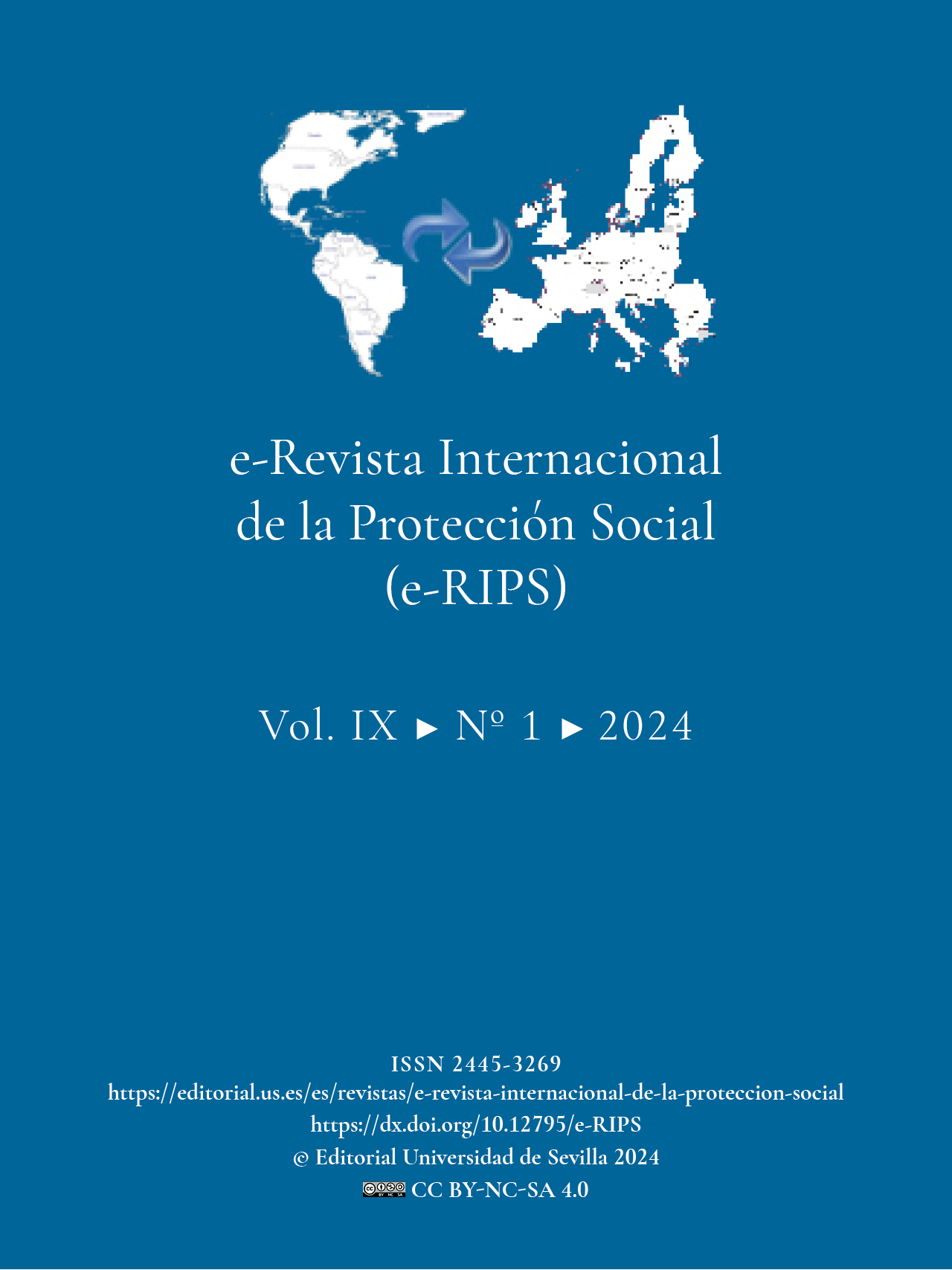Cross-border teleworking and social security: problematic connection
DOI:
https://doi.org/10.12795/e-RIPS.2024.i01.01Keywords:
Telework, Competent State, State of residence, Covid, Framework Agreement on the application of Article 16 (1) of Regulation 883/2004Abstract
The author examines the new forms of work, especially cross-border teleworking, which have developed since the COVID epidemic, and recalls the problem of determining the applicable legislation on Social Security, especially for more than a million and a half border workers who had to become teleworkers with the pandemic. He explains how at all times the authorities tried to maintain the status quo in the field of Social Security to avoid administrative chaos that could be caused by the substantial change in the situation of extra-border workers who until the advent of the Pandemic were contributing in the State of employment and that subsequently,
to exercise as teleworkers from home, could be transferred to the Social Security of the State of residence.He also analyzes the Framework Agreement on the Application of article 16(1) of Regulation (EC) 883/2004. Finally, he presents a series of recommendations to prevent cross-border teleworking from slowing down as a result of an overly conservative application of the conflict rules of Social Security coordination by the States and the European Institutions.
Downloads
References
Administrative Commission: Practical guide on the applicable legislation in the European Union (EU), the European Economic Area (EEA) and in Switzerland, 2013.
Carrascosa Bermejo, D.: “Teletrabajo internacional y legislación de Seguridad Social aplicable: estado de la cuestión y perspectivas en los Reglamentos de coordinación de la UE”, Revista Internacional y Comparada de Relaciones Laborales y Derecho del Empleo, vol. 10, núm. 2, 2022.
Contreras Hernández, Ó.: “Desplazamiento de trabajadores y la revisión del Marco Legal Europeo: ¿el principio del fin del dumping social y la competencia desleal?”, Revista de Derecho Comunitario Europeo, núm. 69, 2021.
De Pauw, B. y Verschueren, H.: “The Framework Agreement on the Applicable Social Security Law in case of habitual cross-border telework after the pandemic”, ERA Forum, 2023, 24, https://doi.org/10.1007/s12027-023-00766-5.
Eurofound: Living, Working and COVID-19, Publications Office of the European Union, Luxembourg, 2020.
Eurofound: The Rise in Telework: Impact on Working Conditions and Regulations, Publications Office of the European Union, Luxembourg, 2022.
European Commission: Guidelines concerning the exercise of the free movement of workers during COVID-19 outbreak, [2020] OJ C 102I, 2020.
European Labour Authority: Impact of teleworking during the COVID-19 pandemic on the applicable Social Security: overview of measures and/or actions taken in the EU Member States to facilitate a flexible approach to the applicable Social Security of teleworking cross-border workers, Bratislava, 2021.
Jorens, Y. y Lhernould, J. P. (eds.): Think tank report 2008. Towards a newframework for applicable egislation. New forms of mobility, coordination principles and rules of conflict, trESS, 2008.
Lhernould, J. P.: “Les enjeux juridiques du télétravail transfrontalier”, Revue de Jurisprudence Sociale, núm. 7, 2021.
OECD: Teleworking in the Covid-19 pandemic: trends and prospects, Paris, 2021.
Pazó Argibay, J. M.:“Ley de Seguridad Social aplicable al teletrabajo transfronterizo. Una aproximación al Acuerdo Marco sobre Teletrabajo Transfronterizo en la UE, EEE y Suiza”, Temas Laborales, núm. 170, 2023.
Sánchez-Rodas Navarro, C. (dir.): Los Reglamentos de Coordinación de Sistemas de Seguriad Social en la Unión Europea, Laborum, Murcia, 2021.
Sánchez-Rodas Navarro, C.: “El artículo 138 de la Ley de la Jurisdicción Social: luces y sombras del proceso de movilidad geográfica”, Iuslabor, núm. 1, 2022.
Sánchez-Rodas Navarro, C.: “Recensión de la obra de Giuseppe Ludovico: Lavori agili e subordinazioni”, e-Revista Internacional de la Protección Social, vol. 8, núm. 2, 2023.
Schoukens, P. y Everaert, G.: “A reflection on telework in Social Security Coordination”, Zbornik Pravnog Fakulteta u Zagrebu, núm. 73, 2023.
Schoukens, P.: “Social Security coordination and non-standard forms of working”, Revue Belge de Sécurité Sociale, 2019(1).
Sierra Benítez, E. M.: “Teletrabajo, uberización y robotización del trabajo: propuesta para un derecho del trabajo consistente (sólido, estable y duradero)”, Ideides, núm. 20.
Sostero, M.; Milasi, S.; Hurley, J.; Fernández-Macías, E. y Bisello, M.: Labour market change. Teleworkability and the COVID-19 crisis: a new digital divide?, Eurofound Working Paper, 2020.
Strban, G.; Carrascosa Bermejo, D. y Schoukens, P.: Analytical report 2018.Social Security coordination and non-standard forms of employment and self-employment: interrelation, challenges and prospects, Publications Office of the European Union, Luxembourg, 2020.1
Verschueren, H.: “The application of the conflict rules of the European Social Security coordination to telework during and after the COVID-19 pandemic”, European Journal of Social Security, núm. 24, 2022.
Published
How to Cite
Issue
Section
License
Copyright (c) 2024 carlos Garcia de Cortazar nebreda

This work is licensed under a Creative Commons Attribution-NonCommercial-ShareAlike 4.0 International License.
Authors being published in this journal agree to the following terms:
- Authors retain their copyright and they will guarantee to the journal the right of first publication of their work, which will be simultaneously subject to license recognition by Attribution-NonCommercial-ShareAlike (CC BY-NC-SA 4.0 DEED)
that allows others to share such work provided that the author’s name and his first publication in the e-International Review on Social Protection is stated. - Authors may take other non-exclusive distribution license agreements version of the published work (e.g. deposit in an institutional digital file or publication in a monographic volume) provided that the initial publication in this journal is stated.
- Authors are allowed and encouraged to disseminate their work via the Internet (e.g. in institutional digital files or on their website) prior to and during the submission process, which can lead to interesting exchanges and to increase citation of the published work.











